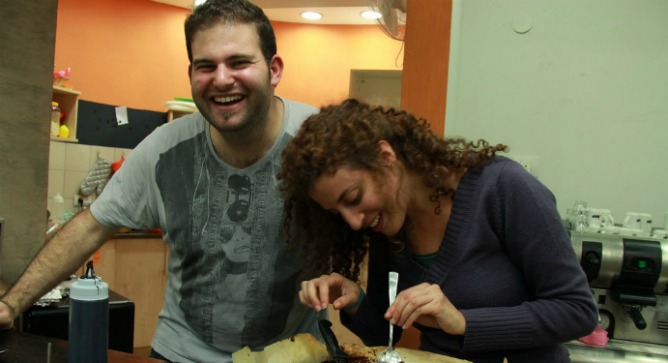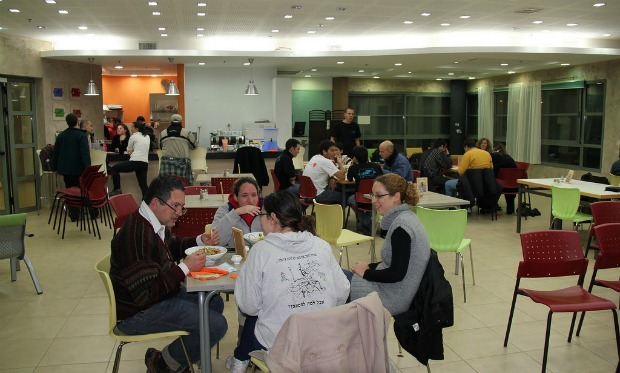At a unique coffee shop in the dormitory of Tel-Hai College near Israel’s border with Lebanon, about 40 area residents with psychiatric disabilities can drop in for coffee and conversation without fear of stigma.
Café Motek (“Sweetie”) is a social integration project bringing together students, residents of nearby kibbutzim and villages, and clients of the Kiryat Shmona branch of Enosh, the Israeli Mental Health Association.
Spread the Word
• Email this article to friends or colleagues
• Share this article on Facebook or Twitter
• Write about and link to this article on your blog
• Local relevancy? Send this article to your local press
Two Tel-Hai social-work students came up with the idea through their field work at Enosh, says Gilad Levi, who manages the café. “They started to understand that our beneficiaries needed a place to go and meet people in an environment where they are not tagged as ‘sick,’ allowing direct communication as equals,” he tells ISRAEL21c.
Café Motek opened in 2006 as an unprecedented joint venture between the college and Enosh. Seven Enosh beneficiaries, 15 Tel-Hai students and 10 National Service volunteers staff the shop, which is open three days a week and also offers special evening events such as movies and concerts to attract local residents.
The students receive a community-service stipend, although many stay on voluntarily after graduation. The staff members with mental illness currently volunteer, but they could earn an income from the enterprise if the organization is successful in working out arrangements with the Ministry of Health.
Coffee and camaraderie
The coffee-shop model for social integration began with an Enosh site in Haifa. After Café Motek, two more have opened in Tel Aviv in addition to Café Reich, a social business in which Enosh clients can become part owners.
“The main goal of all these programs is to provide a place for our beneficiaries to get vocational training and socialize with others who have similar problems, and with the wider community,” explains Michal Danin-Hollander, Enosh’s director of resource development.
But only Café Motek has the advantage of being situated where there is a resident clientele. Danin-Hollander tells ISRAEL21c that the constant presence of college students helps reduce stigmatization for the mentally ill customers. This is another of Enosh’s goals.
“If there were less stigma, people would become part of the community much more easily. Employers wouldn’t mind hiring a person dealing with a psychiatric disability, and homeowners wouldn’t mind having one live next door,” she says.
In the sparsely populated Upper Galilee, Café Motek is the only place where the mentally ill can learn restaurant management skills such as waiting tables, serving customers, washing dishes and even managing the café’s online presence.
That last job belongs to Yoram Kaplan, a 44-year-old member of a nearby kibbutz. He studied social work at Tel-Hai several years ago and learned that having social outlets could help lift his disabling chronic depression.
“Now he is a social worker in the community but comes twice a week to do food preparation at Café Motek, plus all the graphics for our Facebook page,” says Levi.
“We are the most northern place in Israel. It’s not like Tel Aviv or Jerusalem, where there are five or 10 places like this,” he points out. “In our area, Café Motek is the only place that can provide this kind of work.”
‘Everybody wants to be part of it’
Café Motek is the most requested option for community service at Tel-Hai, Levi reports. Surprisingly, not only social work and psychology majors are interested.
“Now there are a lot of students even from the sciences,” says Levi. “It is interesting to see people here who never thought they would talk or work with people with disabilities. Everybody wants to be part of it.”
Some of the workers in the café are assigned to strike up conversations with patrons to help create a comfortable social atmosphere. “They talk about basketball and everything else you would hear in a conversation at a coffee shop,” says Levi, who previously worked with teenage girls at risk.
Apparently, this strategy is working. “You see friendships between students and our members outside the program,” says Levi. “This is even more amazing when you consider that our members are between 19 and 45, yet you will see a 30-year-old drinking at a pub with a 22-year-old student.”
Because the students and National Service volunteers working at Café Motek wanted to learn more about how to deal with mentally ill customers and co-workers, Levi introduced an educational segment at the end of monthly staff meetings. At one recent meeting, participants in Enosh’s Dialogue Project came to tell their personal stories. Another time, a psychiatrist explained about psychiatric medications.
“Every student in this program becomes like an ambassador for mental-health issues,” says Danin-Hollander.














